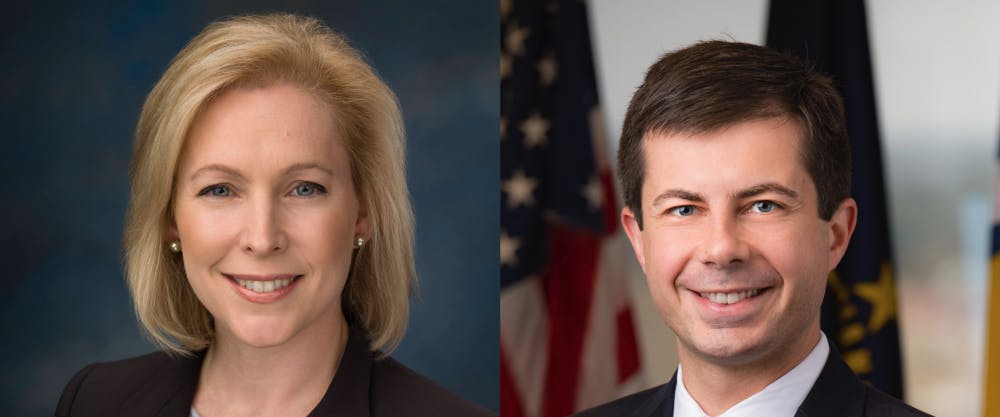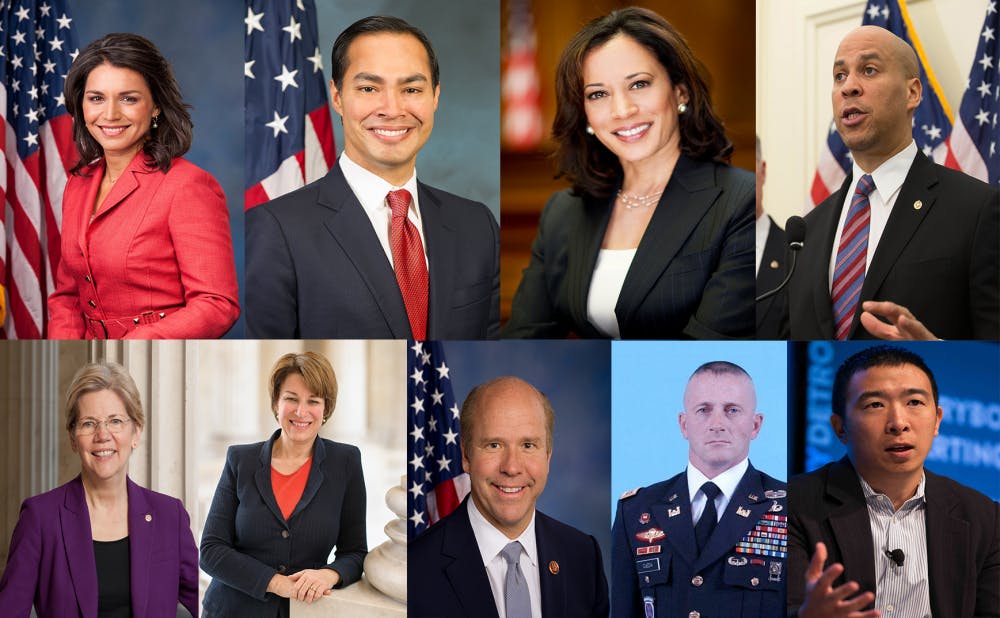Less than two years from the 2020 election, presidential primary campaigns are quickly heating up. Eleven Democrats have already officially declared their candidacy or formed exploratory committees.
On Feb. 10, Amy Klobuchar, a senator from Minnesota, became the most recent Democrat to declare her candidacy in an ever-growing, wide-open field of potential runners. Such a large pool of Democratic candidates is not out of the ordinary. Although open presidential nominations typically attract a large number of candidates, this year's pool may turn out especially large, said David Rohde, Ernestine Friedl professor of political science.
“I think the Democrats think that their chances to win the presidency next year are very good, and therefore it makes the Democratic nomination more valuable than it otherwise would be–it’s the law of supply and demand,” Rohde said.
Something else to consider is that, unlike in 2016, the Democrats have no clear front-running candidate.
“There isn’t somebody like [Hillary] Clinton who was clearly the front-runner that you could see room for maybe just one more candidate with a different policy position, like Sanders,” said John Aldrich, Pfizer, Inc./Edmund T. Pratt, Jr. University professor of political science. “Whereas now, it’s really a flat, open nomination."
Democrats also recognize that this particular nomination will critically define the future of the Democratic direction and coalition.
“The Democratic Party is at a leadership transition, and what exactly the Party is going to be in the future is open," Aldrich said. "One of the ways it’s going to be resolved is through this nomination to see which direction the party seems to get support from in the public and how they’re going to go."

There are currently nine candidates who have officially entered the race, according to the Chicago Tribune: Klobuchar, Cory Booker, John Delaney, Elizabeth Warren, Kamala Harris, Julian Castro, Tulsi Gabbard, Andrew Yang and Richard Ojeda, who has already suspended his short-lived campaign. Two others who have formed exploratory committees are Kirsten Gillibrand and Peter Buttigieg.
Aldrich explained that it is safe to predict that this candidate pool will only get larger as more of the on-the-fence candidates—like former Vice President Joe Biden, former Rep. Beto O'Rourke and Sen. Bernie Sanders—make their final decisions in the coming months. Aldrich noted that it is also possible that a fair number of candidates will drop out if they have difficulty finding financial support.
Although it is unpredictable which candidate will emerge from this pool, Rohde and Aldrich indicated some factors and trends that will make predicting the outcome easier as the race becomes develops.
According to Rohde, the early part of the nomination process is typically a race within the factions of a party. Each candidate within each faction fights to become the victor, and that person then moves onto the last stage to compete against the remaining candidate of another faction.
Rohde explained that of the people who have declared their candidacy or announced exploratory committees so far, Democrats like Senators Warren, Harris and Gillibrand are all from the same faction.
"They’re mainly competing with each other for being the representative of the progressive faction in the party, or at least the female representative of the progressive faction, and then they can fight it out with Cory Booker or someone after that," Rohde said.
Although the remaining faction representatives have traditionally split along moderate and progressive lines, Aldrich introduced the possibility of another split in the Democratic primary race, especially in light of an increasing number of minority voters in the United States.
“So whether minorities are going to be appealed to by a moderate [or a progressive], that’s the reason the party is open,” Aldrich said. “Moderate is moderate, but there are now a variety of directions the more progressive vote could go and that’s what’s up for action. The progressive vote is up for being either split or captured by different people.”
Aldrich and Rohde agreed that predictions for the moderate faction, however, may become clearer depending on whether Biden chooses to run or not. Biden has an inherent advantage over current moderate candidates because of his already broadly known, credible status and general likability amongst Democrats.
“I think he’ll sufficiently make it difficult for anybody else on the moderate side to accumulate enough delegates to really compete against whomever emerges out of the [progressive] wing,” Aldrich said.
Another factor that will play a role in predicting the nomination is the time at which states hold their primary election.
Iowa, New Hampshire, Nevada and South Carolina are set at the beginning. Some of the states that follow—such as California, Massachusetts and Vermont—are the home states of potential candidates.
“In the Southern states, the Democratic Party is dominated by minorities. So the candidate that can have the strongest appeal to minorities at that point has the potential for a tremendous advantage,” Rohde said. “And doubling that is that the only minority candidate among [Harris from California, Warren from Massachusetts and Sanders from Vermont] is Harris. And California is also the largest pool of votes, forget the convention.”
Ultimately, the successful Democratic candidate will be one who is able to unite votes across these factions, Rohde explained. Whether the Democratic nominee can also be the most electable candidate and beat President Donald Trump, however, is also unpredictable.
Trump’s likelihood of winning in 2016 was extremely low, and his likelihood of winning in 2020 may be even lower, but still extremely possible, Rohde said.
“I think his winning re-election is less likely than his original election because of the way he produced his electoral vote victory," Rohde said. "He’s got to win the industrial states across the western part of the East and the Midwest, Pennsylvania, Michigan and Wisconsin. I think it’s unlikely that he can do that again. They were very narrow victories."
Get The Chronicle straight to your inbox
Signup for our weekly newsletter. Cancel at any time.

Mona Tong is a Trinity senior and director of diversity, equity and inclusion analytics for The Chronicle's 117th volume. She was previously news editor for Volume 116.

